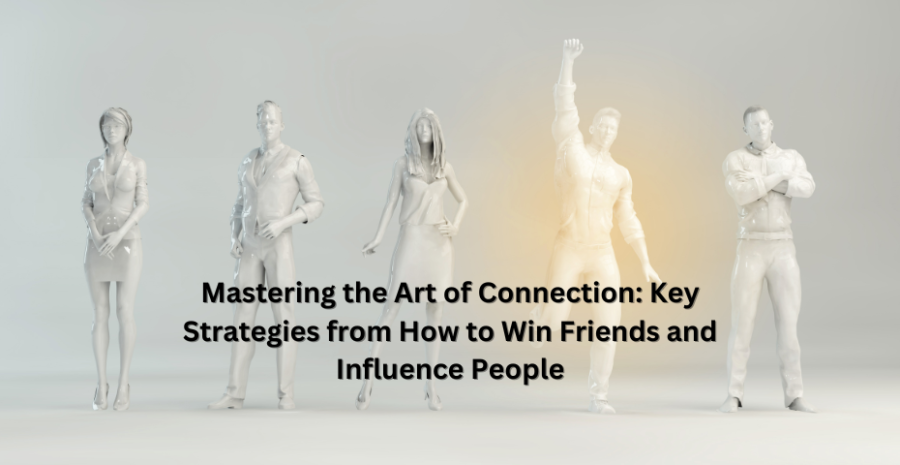Mastering the Art of Connection: Key Strategies from How to Win Friends and Influence People

In today's interconnected world, the ability to forge meaningful connections is more crucial than ever. How to Win Friends and Influence People, offers invaluable insights into the art of building strong, lasting relationships.
This provides practical strategies that remain relevant in our modern, fast-paced society. Mastering the art of connection not only enhances personal relationships but also drives professional success.
By employing these principles—such as genuine appreciation, active listening, and sincere interest in others—you can create a positive impact in every interaction. These strategies foster trust, respect, and mutual understanding, essential components of effective communication and collaboration.
As we delve into key strategies from this blog, you'll discover how these timeless techniques can transform your approach to connecting with others, leading you to greater success in all areas of life.
1. Begin with Praise and Honest Appreciation

Starting interactions with genuine praise sets a positive tone. This emphasizes that sincere appreciation is a powerful motivator. By recognizing others' efforts, you build goodwill and foster a supportive environment.
This approach not only strengthens relationships but also encourages continued cooperation and improvement. It's essential to be honest and specific in your praise to make it meaningful and impactful.
2. Show Genuine Interest in Others

One of the core principles is to show a sincere interest in other people. By asking questions and listening attentively, you demonstrate that you value their thoughts and experiences. This fosters a sense of importance and connection.
People are more likely to respond positively and engage with you when they feel heard and understood. Building this rapport is crucial for creating strong, lasting relationships.
3. Smile: A Simple Yet Powerful Gesture

A smile is a universal sign of friendliness and approachability. This highlights the power of a simple smile in making others feel welcome and appreciated. Smiling can break down barriers and create a warm, inviting atmosphere.
It conveys positivity and can significantly impact how others perceive and interact with you. Remember, a genuine smile is more than just a facial expression; it reflects your inner attitude.
4. Remember Names and Use Them

A person’s name is, to them, the sweetest sound in any language. This advises making a conscious effort to remember and use people's names in conversation. This small act shows respect and recognition, making individuals feel valued.
It enhances personal connections and makes your interactions more memorable. Practice this by associating names with unique features or repeating them in your mind when first introduced.
5. Be a Good Listener and Encourage Others to Talk About Themselves

Listening is a critical component of effective communication. This stresses the importance of truly hearing what others have to say. By encouraging people to talk about themselves, you show that you care about their perspectives.
This not only builds trust but also helps you gain insights into their needs and motivations. Active listening involves paying attention, asking follow-up questions, and avoiding interruptions.
6. Talk in Terms of the Other Person's Interests

Connecting with others often involves discussing topics that interest them. This suggests finding out what others are passionate about and steering conversations in that direction. This shows empathy and understanding, making your interactions more engaging.
When you align discussions with their interests, people are more likely to open up and share. This strategy can be especially effective in both personal and professional settings.
7. Make the Other Person Feel Important – and Do It Sincerely

Everyone desires to feel important and valued. These advises making a conscious effort to acknowledge others' significance. This can be done through genuine compliments, recognition of achievements, or expressing gratitude.
When people feel appreciated, their self-esteem rises, and they are more likely to respond positively. Sincerity is key; insincere flattery can be easily detected and can have the opposite effect.
8. Avoid Criticism and Focus on Positive Reinforcement

Criticism often leads to defensiveness and resentment. This advocates for focusing on positive reinforcement instead. Highlighting what someone did well and offering constructive suggestions fosters a more productive and positive environment.
This approach encourages growth and improvement without damaging relationships. It's essential to be specific about what you appreciate and to offer guidance in a supportive manner.
9. Show Respect for the Other Person's Opinions

Respecting others' opinions, even when they differ from your own, is crucial for building strong relationships. This emphasizes that showing respect fosters an environment of mutual understanding and cooperation.
Instead of arguing, seek to understand their perspective and find common ground. This approach not only diffuses potential conflicts but also opens the door for more meaningful and productive conversations.
10. Make the Other Person Feel That the Idea Is Theirs

Encouraging others to feel ownership of ideas can be incredibly empowering. This suggests that when people believe an idea is theirs, they are more invested in its success. This can be achieved by guiding conversations in a way that leads them to conclusions or by genuinely incorporating their suggestions into your plans.
This sense of ownership fosters enthusiasm, commitment, and a collaborative spirit, driving success for everyone involved.
In conclusion, mastering the art of connection through the strategies outlined in How to Win Friends and Influence People can profoundly impact both your personal and professional life. By starting with genuine praise, showing sincere interest in others, and maintaining a positive demeanor, you set the stage for meaningful interactions.
Remembering names, listening actively, and discussing topics of interest to others foster deeper connections and mutual respect. Making others feel important and avoiding criticism builds a supportive environment where people feel valued and motivated.
Respecting differing opinions and empowering others to feel ownership of ideas further enhances collaboration and trust. These timeless principles not only improve your ability to influence and lead but also create a network of strong, supportive relationships.
As you incorporate these techniques into your daily interactions, you'll find that the quality of your connections significantly improves, paving the way for greater success and fulfillment. Embracing these strategies will not only transform your relationships but also enhance your overall effectiveness and satisfaction in both personal and professional spheres.
Mastering these strategies from How to Win Friends and Influence People can significantly enhance your ability to connect with others. By applying these principles, you can build stronger, more meaningful relationships that pave the way for personal and professional success.
.jpg)
About: Andries vanTonder (65)
Over 45 years selfemployed
He is a Serial Entrepreneur, an Enthusiastic supporter of Blockchain Technology and a Cryptocurrency Investor
Find me: Markethive Profile Page | My Twitter Account | My Instagram Acount | and my Facebook Profile.
Markethive News

%20(1).png)
